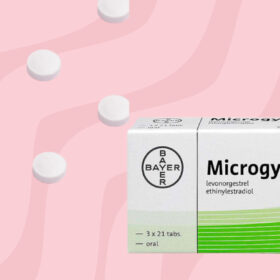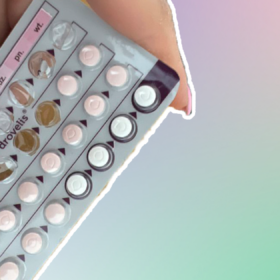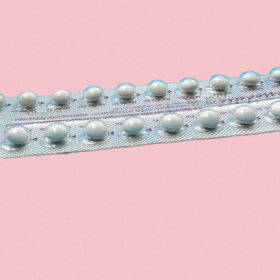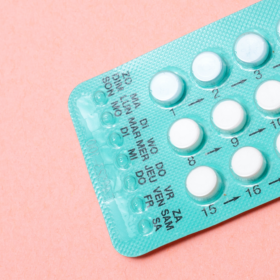
Contraception: Weight Gain and Loss

This guide has been peer reviewed by the medical team at The Lowdown and the FSRH and is regularly reviewed as per both clinical content policies
In this article
What's the lowdown?
The injection is the only form of contraception where research suggests an association with weight gain
Other forms of hormonal contraception could be associated with weight changes but research has not identified a causative link and most people will not experience this
We naturally gain weight with age, and many lifestyle factors can influence weight fluctuation
The debate surrounding contraception and weight gain is as old as the pill itself, but many of us rely on anecdotal evidence from friends and online forums to determine the side effects we might experience. It’s a complex issue, and one that has been researched extensively, so let’s see what the science says.
Does the combined pill make you gain weight?
Combined methods of contraception, such as the combined pill, patch and ring, are those which deliver both oestrogen and progestogen to the body in order to stop the release of an egg each month and therefore prevent pregnancy. Studies have hypothesised that oestrogen may promote fat storage.¹ However, after much debate and many studies, there is no proof that combined birth control causes weight gain. In fact a review of available research in 2014 found no causal link between combined hormonal contraception and weight gain.² ³ ⁴ So why might you notice your weight change whilst using this method?
Water retention
One reason some women might see an increase in their weight when taking combined contraception is water retention. Oestrogen affects the way our kidneys produce certain proteins, which can have an impact on the way the body regulates water, causing an increase in the fluid kept within the body’s tissues. This kind of water retention can also happen just before your period, and is responsible for that lovely puffy, bleugh feeling some of us are so familiar with. If you are affected by water retention on the combined pill it may be worth talking to your doctor about switching the brand or type of pill. Newer progestogens in some combined pills can help reduce these symptoms, and may be less likely to cause water retention than others.
Appetite changes
Some women find that hormonal birth control increases their appetite, causing them to eat more and experience weight gain. There’s a pretty big gap in the research about this, which is frustrating, so we can’t give you any definitive answers about whether there’s a proven link. This has been reported as something The Lowdown’s users have experienced, though, with some saying that appetite reduced when they stopped taking contraception. It’s important to note that some users also said they felt a decrease in appetite, so this is definitely something that needs further research.
Weight restrictions
Combined contraception is also the only form of contraceptive that is technically restricted depending on body mass index (BMI). BMI is a person’s weight in kilograms (or pounds) divided by the square of their height in meters (or feet). The Faculty of Reproductive and Sexual Healthcare in the UK state that if a woman’s BMI is over 35, the risks of using combined contraception outweigh the benefits.⁴ This is because the risk of a blood clot in the legs or the lungs rises as BMI increases and combined contraception increases this risk further.⁴
What are you saying?
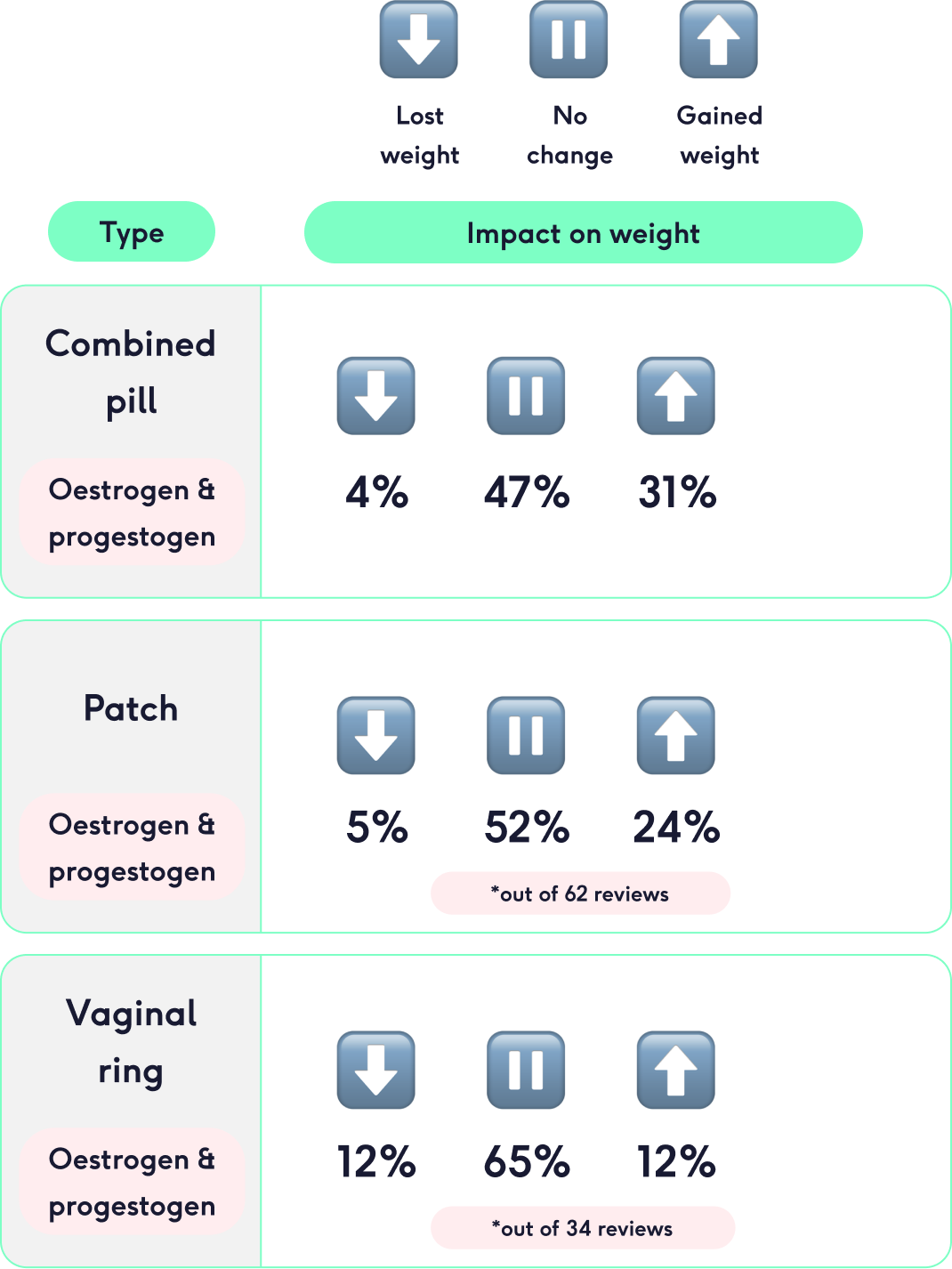
At the time of writing, the majority of The Lowdown’s users reported no changes in weight when using the combined pill, with 31% saying they had gained weight and 4% reporting that they had lost weight.
For the patch, 52% of users reported no change, 24% reported weight gain and just 5% said that they had lost weight.
The vaginal ring seems to have the highest percentage of users reporting more stability in their weight, with 65% of users reporting no change, 12% reporting weight gain and 12% reporting weight loss.
Does the mini pill make you gain weight?
Progestogen-only contraception, such as the mini pill, delivers progestogen to the body to prevent pregnancy. Research has found limited evidence of change in weight whilst using progestogen-only contraceptives.⁵ In studies most women gained less than 4.4lb (2kg) within 6 to 12 months of beginning progestogen-only contraception,⁵ so any weight gain you might experience from birth control is unlikely to be dramatic. There is no proof that the progestogen-only pill causes weight gain,³ but here we discuss why your weight might change whilst using this method.
Water retention
Synthetic progestogen (the stuff that’s made in a lab) has also been linked with water retention. As we said earlier, though, this isn’t fat, and progestogen-only contraceptive methods are less likely to cause these effects than those containing oestrogen.
Appetite and weight changes
As with combined contraceptive methods, research surrounding appetite changes with the progestogen-only pill is limited.
While some of The Lowdown’s users have reported weight gain on birth control, this varies in severity from a little to a lot of weight. Some users have stated that their appetite increased when they stopped taking progestogen-only contraception, and others found a decrease in their appetite while taking the mini pill.
What are you saying?

The Lowdown’s users were pretty evenly split on this one: at the time of writing 42% of those using the progestogen-only pill reported no change in their weight, with 38% saying they’d gained weight and 4% saying they’d seen weight reduction.
60% of hormonal coil users reported no change in their weight, with 18% reporting weight gain and 5% reporting weight loss.
Users of the implant reported a similar experience to those on the mini pill, with 37% reporting no change in their weight, 41% reporting an increase and 3% noticing weight loss.
What about the hormonal coil?
Research suggests that whilst some people may experience weight gain whilst using the hormonal coil, this is not significant and no causal link has been identified. ³ ⁶ Whilst our Lowdown reviews suggest users of the implant experience similar changes in weight to those using the mini pill, users of the hormonal coil (aka IUS or hormonal IUD) are much more likely to report NO change in weight. This could be because the hormonal coil releases a lower daily dose of progestogen than other hormonal methods like contraceptive pills, or because users of the hormonal have less systemic absorption of progestogen (meaning lower levels of progestogen in the blood), which could be the reason for fewer associated side effects. More research is needed to determine whether this is the case.
Does the injection make you gain weight?
Like the contraceptives above, the injection is a progestogen-only form of hormonal contraception. We’ve decided to give it its own section here, because the research, advice and side effects are slightly different to those of other progestogen-only methods.
The injection is the only method of contraception where weight gain is a proven potential side effect that women should be counselled for.³ ⁷ This sounds alarming, but in reality most women don’t gain weight when using the injection. However, the possible risk of weight gain is something that healthcare professionals should make women aware of when they are choosing their contraception, and the consequences of this side effect should be discussed before the injection is chosen.
Who is most at risk?
The research as it stands doesn’t give us a precise answer about individual risk, but it does tell us a couple of things that might help you to make the best choice. Firstly, you are most likely to gain weight if you are under 18 with a BMI of over 30 when you begin using the injection.³ ⁷ Secondly, if you gain more than 5% of your body weight within six months of starting the injection, you are more likely to continue gaining weight.³ ⁷ If this sounds like you, it might be worth considering a different method of contraception.
Restrictions
Whilst your weight alone does not stop you from being able to use the injection as contraception, if you also smoke or have medical problems like diabetes the FSRH advises the risks may outweigh the benefits.⁴ If you are already overweight, you might want to consider a different contraception before choosing the injection to avoid potential negative effects on your health.
What are you saying?

At the time of writing 53% of those using the injection told The Lowdown that they had gained weight, the highest of all the contraceptives. 35% reported no change in weight, and 3% reported weight loss.
It’s important to note that at the time of writing the majority of those who reviewed the injection for The Lowdown were under 25 years old. An early study using a broader age range found that whilst the injection was associated with weight gain slightly more frequently than other hormonal contraceptive methods, this wasn’t significant.⁸
Does hormone-free contraception make you gain weight?
Hormone-free contraception is defined as anything that prevents pregnancy but doesn’t contain any hormones. Here, we’ll discuss the copper coil, female sterilisation and condoms.
Copper coil and weight gain
The copper coil (IUD) contains no hormones, so there is no biological reason it would cause weight changes. Research shows whilst women may experience weight changes whilst using the copper coil, this is not significant and there is no causal link.³ ⁶ Weight gain whilst using the copper coil is likely to be a consequence of confounding factors such as increasing age.
Barrier methods
Barrier methods, such as condoms and diaphragms, are not associated with weight changes.
Irreversible methods
We’ll leave the boys out of this one and focus on female sterilisation. You might have heard of people ‘having their tubes tied’, which conjures up all sorts of baffling images, but in reality female sterilisation is a lot more simple than that. It’s a permanent and irreversible contraceptive procedure, involving an operation in which the fallopian tubes are blocked or removed (known as tubal ligation).
As tubal ligation does not affect your hormones or – as a result – appetite, it is not known to cause weight changes.
What are you saying?
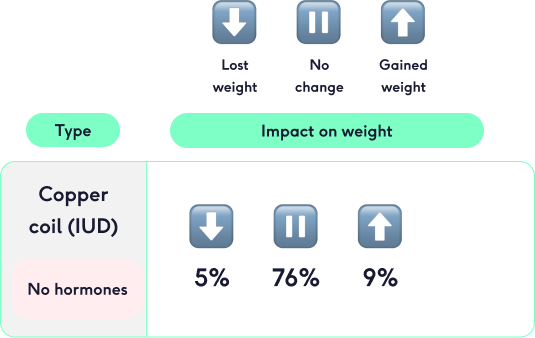
At the time of writing 76% of copper coil users told us that they saw no change in their weight, with 9% reporting weight gain and 5% reporting weight loss.
For people whose partners used the male condom, 98% saw no change in their weight, with 2% reporting that they couldn’t tell whether their weight had changed. For the female condom and the cap or diaphragm, 100% saw no change in their weight.
Of those who had undergone tubal ligation (female sterilisation) 75% reported no change in weight, with 25% reporting a weight increase.
All men who had undergone vasectomies reported no change in their weight.
Do natural methods make you gain weight?
Natural contraceptive methods also contain no hormones, and rely on knowing your body and careful timing.
Fertility awareness
Natural family planning, also known as the Fertility Awareness Method, involves monitoring your menstrual cycle to identify when you are most fertile. People who use this method will check for signs of ovulation, such as temperature and cervical mucus, and will avoid sex or use withdrawal or barrier methods (such as condoms) during this time. Apps like Natural Cycles can be used to log your cycle and identify your fertile days.
As natural family planning involves no changes to your hormones and doesn’t require any other internal or external influences on your body, it is not associated with causing weight changes.
What are you saying?
For The Lowdown, 81% of those reviewing the Natural Cycles app reported no change in weight, with 8% saying that they had gained weight and 4% reporting that they had lost weight.
How can natural contraception impact my weight?
You might be surprised by these numbers; if a method involves no hormones or other intervention, how can it impact your weight? More research is needed here, but we know women naturally gain weight as we get older, and weight changes are common during a normal menstrual cycle. Women using natural family planning may also be more likely to monitor their weight and be aware of fluctuations.
How can I tell whether my contraception is causing weight changes?
While more research is needed into the effects of contraception on our appetite and weight in general, one thing is clear: we gain weight naturally with age. Research has shown⁸ changes in the fat tissue in our bodies as we age make it easier to gain weight, even if we don’t eat more or exercise less than before. In fact, the average person gains around one pound each year from adulthood.⁹ If you’ve been using a form of contraception for a while and have recently noticed an increase in your weight, it could be unrelated, but it is important to talk to your doctor if you are concerned.
It might also be worth thinking about any recent changes you might have had to your lifestyle; have you just moved in with your partner and are eating bigger portions? Have you started university and increased your alcohol intake? Has the pandemic forced you to be less active? There are many factors that can contribute towards weight gain, so it might be useful to look at the bigger picture before writing off your contraception. If you haven’t noticed any changes to your routine, or you simply aren’t sure, do go and speak to your healthcare provider for advice.
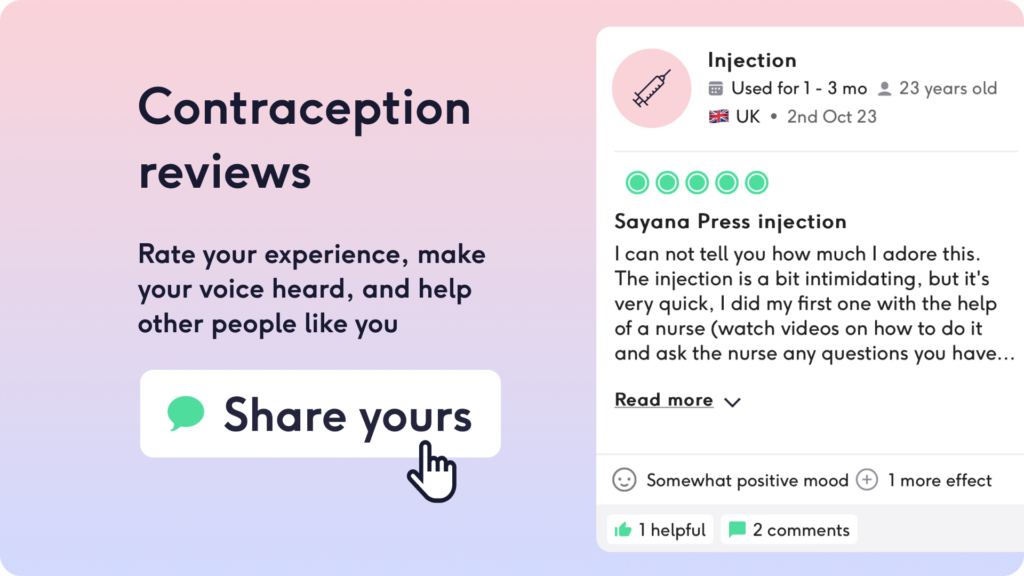
This blog can help you learn more about various contraception options, but it does not give medical advice. You should always speak to a nurse or doctor when making choices about contraception and before starting a new method.
Our medical review process
This article has been medically reviewed for factual and up to date information by a Lowdown doctor.

